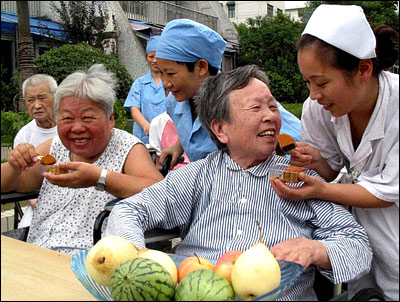Under the planned economy, the government takes care of the
pensions, medical service and other benefits of all civil servants,
and staff and workers of enterprises and institutions. Anyone
employed by a state enterprise or institution could expect
life-long security, even if at a low-level. As Chinese society
ages, the number of retirees is increasing, and some enterprises
have more pensioners than workers on their pay-roll, representing a
very great burden. Since the 1990s, China has actively pursued
reform of the old-age, unemployment and medical insurance systems.
The State Council promulgated the Regulations on Unemployment
Insurance, the Interim Regulations on the Collection of Social
Insurance Premium, and the Regulations on Guaranteeing Urban
Residents' Minimum Standard of Living, providing legal guarantee
for implementation of the social security system. Now, quite
separate from enterprises and institutions, a social security
system under socialized management, integrating old-age,
unemployment, medical insurance and minimum standard of living has
taken preliminarily shape.?
 |
From state- and collective-owned enterprises, social insurance
coverage has expanded to non-state enterprises and institutions as
well as those who are flexibly employed. The security rights and
interests of employees at non-state enterprises are also
guaranteed. At the end of 2005, 174.87 million people participated
in basic old-age insurance, 137.83 million in medical insurance and
106.48 million in unemployment insurance.?
A minimum standard of living system has been established in all
cities and county towns, providing a basic guarantee for residents
whose families' per capita income is below the lowest local
standard. In 2005, there were 22.34 million urban residents
receiving such living standard support, and all poor people meeting
the standard are covered by insurance. The system is being set up
in many rural areas.??
Every year, China has a large number of newly emerged urban
workers, laid-off workers and surplus rural labor, making for acute
employment problems. Whilst continuing to implement positive
employment policies and to increase employment and re-employment
opportunities, the government is speeding up progress on a social
insurance system that protects people's interests and helps build a
harmonious society. From 2006 to 2010, the urban unemployment rate
will be restricted to five percent.